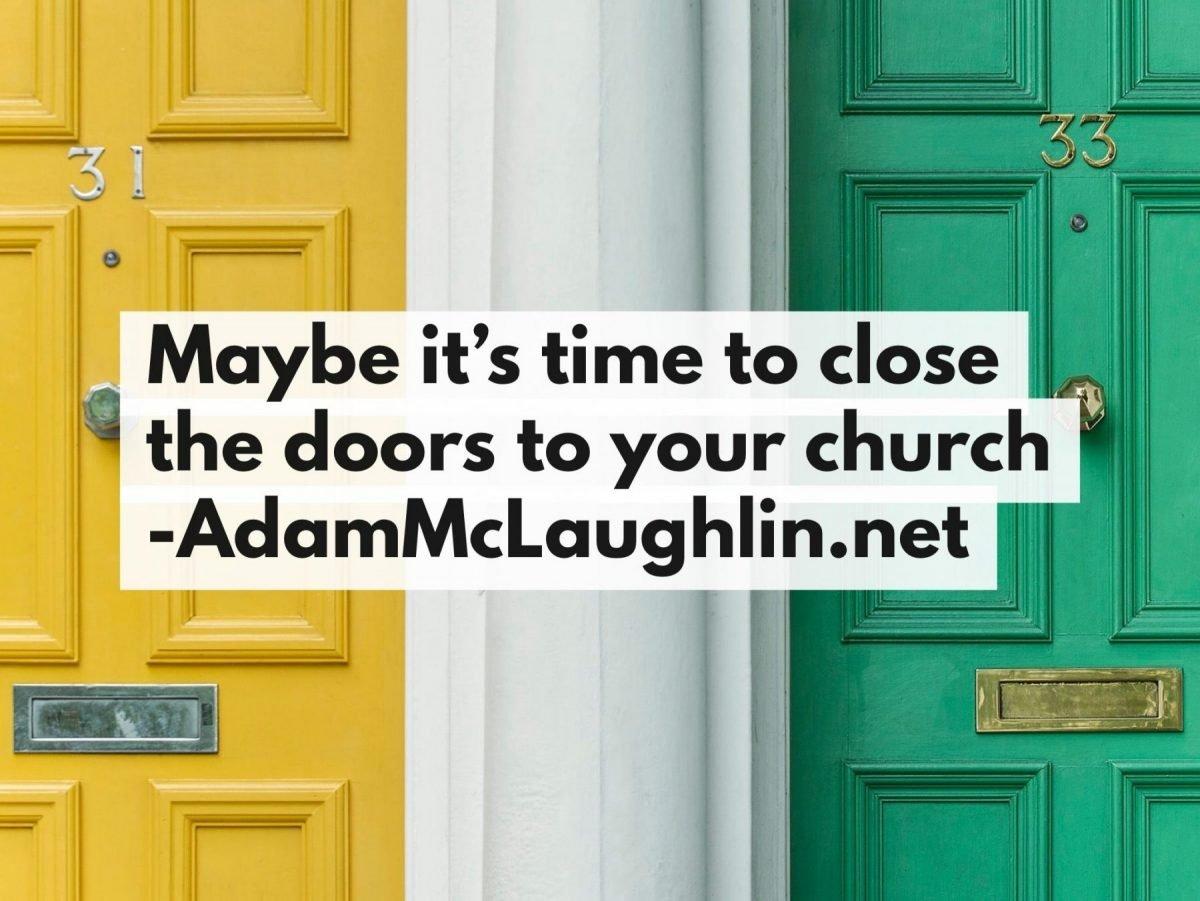Every now and then, I have to write a blog post that cuts deep. This may be one of those. Without using clickbait, or trying to stir the pot, I want to help you hear my heart and hear the hope in this blog post. If your church is on a path towards closing, please considering reading every word.
In this article by Thom Rainer, from Lifeway, he says that 6000-10,000 churches in America will close per year, which means that 100-200 churches that opened the doors last Sunday won’t open the doors this weekend.
It’s so sad to hear, and I wish that statistic didn’t exist. Honestly, I wish that there was only growth and not decline, but the reality is that’s not the case.
Here’s where it starts to hurt, and I’ll apologize in advance for how terrible this is going to sound: Objectively, it would be more helpful if the number of churches closing was higher.
Ugh. I don’t want that to be the case. I wish with everything in me that this didn’t make objective sense, but considering my experience with what I’ve seen and heard, first hand and through a network of people passionately hoping their church wasn’t on a decline, I know this to be the case.
Consider a business that’s in decline: profits have been down for many years, clients are decreasing, they are spending their available budget on staying afloat, taking on debt to pay salaries, or remortgaging their assets to drain their equity and pay the bills.
If this were the case for your business, it would be helpful for someone to come alongside you and say, “It may be time to sell while you still have equity in assets and find another source of income, or simply retire and enjoy your lifetime of work.”
We see this in outdated technology companies, retail stores that have lost out on a price war with big-box retailers, and restaurants that are in a ‘downtown core’ in small towns where retail is moving to the mall on the edge of town.
Where we don’t often see this strategy is with churches. Churches often hold on far too long to emotion, sentiment, and status quo beyond reason, in ways that businesses could never justify.
To be clear, I’m not talking to churches who have had a sudden upset in leadership, lost their building in a hurricane, or another catastrophic event. I’m also not talking to churches who have poor months financially or have gone through a split of some kind and your members are emotionally drained. I’m talking to churches who have a traceable track record of financial and membership decline over years or decades.
There are 2 paths for a declining church:
Keep doing what you’re doing until there’s nothing left.
- Make a significant change and adapt in order to grow and make a difference in your community.
Path 1: Keep doing what you’re doing
Nothing is going to change. Insert the definition of insanity if you’ve kept doing what you’ve always done and expected different results, and then throw in a pile of other cliches.
It just seems so obvious to me that I can’t even justify boring you with the what, but I do want to dig into the ‘How.’
How is it that we can experience years or decades of decline, and still not be willing to change?
For each church, this could look different, but I believe any church can fall into this trap, either from success, indifference, or not knowing how to handle decline. This could be because:
- We had a good month. A new family joined, and our finances were above our costs. Maybe this is a new trend!
- We don’t want Pastor to lose his job, and he’s been doing this his whole career and he has a family, so what else would he do? We’ll continue to give a salary as long as we can.
- From the Pastor: What else would I do? I don’t have a resume outside of working at my church and nobody will hire someone whose most recent track record is years of decline.
- We’ve been in the community for many years, and our city just wouldn’t feel right without us here.
- Maybe if we just pray more, this is just a season of difficulty we’ll pull out of.
- We need to cut costs and remortgage assets, and now it looks like our cash flow is in the positive.
- If we don’t reach our community, then who will? We’re here at whatever cost to be a light in our community.
- Let’s just take it one step at a time. Let’s make sure that Sunday is good, then we’ll think about next Sunday.
- People left the church because they saw a decline in the youth program, kids funding, social events, outreach opportunities, etc. We’re going to stick around and prove them wrong.
OR the case that I think most churches struggle with:
If we were to make a change, what would be the right change? What options actually exist? It’s easier to not make a change.
Either path means a change is coming.
Either you’re going to make a change, or you’re going to run out of people and money and a change is going to happen. You may be trying to preserve a building, or staff salaries, or your pride, but if you run out of people and money, you’re going to lose all of that anyway.
Ask yourself this question:
Based on our rate of decline (in attendance or finances) how many years do we have left at this speed?
Is holding on to hope without reason until our assets or membership hit zero the most effective way to help people in our community meet Jesus?
Path 2: Intentionally make a significant change

Here’s where the logic of ‘Objectively, it would be more helpful if the number of churches closing was higher,’ takes effect.
Here are some options for making a significant change:
Option 1: Merge with a growing church
You may have assets like a building, or investments, or a community center, and committed members, so what if you partnered with a church that is still meeting in a high school or renting space at a library, or trying to get the funding together to renovate a space in a strip mall, or looking to plant a campus in your city. You bring your assets to the table, and they bring a fresh system of what’s working to impact the community.
Your church’s legacy would be adding fuel to the fire of a growing church by providing a building, committed volunteers, and mentors. They’re contribution is taking your legacy and continue to reach your community.
In this case, remember that you’ll need to embrace their systems. This doesn’t turn into a “my house, my rules” situation since your way of doing things has led to a decline. You need to hand over the reins to their system.
One way to approach this option:
Give them the building, change the building to their church name, and let your members know that they can join the new church if they would like. Alternatively, there may be other churches in your area that are the same denomination or style where your current members may feel more comfortable.
It’s important to not present it as “They’re joining us” or “We’re joining together” but rather “our legacy is going to be gifting our assets to them. Consider joining their church in this building, or here is another alternative if you’d like something more in line with our style.”
In some cases, the members of the church gifting the building simply join another church altogether and hand over their keys (obviously with the proper due legal process).
Option 2: Liquidate your assets and help a new church plant or campus plant
You might have a substantial amount of equity between your building and property, but if your building is in need of renovations or a design overhaul, then it may not actually be considered an asset to a smaller, growing church or a church looking to plant a campus – it might actually be a liability to need to fix the roof, remove the wallpaper and paint from top to bottom or fix the parking lot that’s home to a few ducks and frogs and completely unusable every time it rains.
Consider liquidating everything and find a growing church to invest those assets into. Leverage your assets while they can make a difference, rather than waiting until they vaporize.
It could be tempting to “merge” with another church in your denomination, or a church of a similar style to yours, and pool your resources together. While I’m not advising against that, I would want you to consider if they are a growing church with upward momentum, or if you’re simply pooling assets to prolong their decline.
Option 3: Bring in new leadership SOONER THAN LATER

If your current leadership (staff or volunteers) have only been able to create a track record of decline, then they need to have the self-awareness to step aside and say “I don’t know what to do, and for the sake of our church and our community, someone else needs to step in.”
Again, I’m not saying this should be the case after a few months or even a year or two of decline, but after more than a couple of years without an upside, (and in many cases, more than that) it’s time to look at the business side of things and say “Would a major corporation allow their CEO to lead for a decade of decline without making a change?”
Our mission as the church is much more significant than inventing a new gadget or turning a profit. Our commitment to reach that significance has to be reflected in our decisions, no matter how tough they may be.
This decision has to be made sooner than later. Waiting until there’s only red in the bank account and nothing left of the membership is like setting fire to potential. If you have any desire to see the organization turn around, give “the new guy” something to work with.
I’m not pretending this is an exhaustive list, and there may be another option that is a fit for your church and community but making the decision to make a change is the first step.
Do you know of any great resources that would be helpful for a church looking to make a change? Leave it in the comments below so we can learn together!

 Keep doing what you’re doing until there’s nothing left.
Keep doing what you’re doing until there’s nothing left.